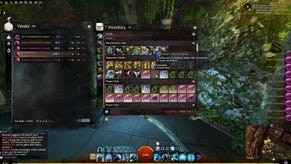How Guild Wars 2 does crafting
Never make something "worthless".
Guild Wars 2 uses a discovery crafting system, whereby blindly or experimentally combining up to four types of material can reward a recipe - so the item can be remade.
In Guild Wars 2 - unlike World of Warcraft or Lord of the Rings Online et al - only a handful of recipes will be taught by NPCs or looted from monsters. Why? To allow players who spend time on their craft the ability to "distinguish" themselves, wrote GW2 game designer Alex McLeod on the game's blog.
There are eight crafting disciplines and players can have two active at a time. The disciplines are Weaponsmith (melee), Huntsman (ranged, torches, warhorns), Artificier (magical staves, sceptres), Armorsmith (heavy), Leatherworker (medium), Tailor (light), Jewelcrafter (rings, necklaces) and Cook (consumables).
You have the option of changing disciplines by paying a small fee to an appropriate NPC - the best bit being that changing back remembers and regains skill level and recipes, so nothing but money is really ever lost.
There are 400 skill points for each discipline, and crafting uses a levelling system - each item is worth experience. Crafting one item often bestows multiple points of experience, the idea being that "you should never have to make something you consider worthless".
Each of the disciplines can also fashion upgrades; a Weaponsmith can make a handle that bestows a poisonous quality to weapons, for instance.
To make items you will need resources. These are found in three ways: using salvaging kits bought from merchants to recycle old equipment; by looting monsters for hides, trophies and other materials; and by harvesting - mining ore veins, picking plants and chopping trees.
In Guild wars 2, all characters can gather all types of resource - they're not locked to a gathering profession or crafting discipline. What's more, nodes such as ore veins, plants and trees will be shared so one person can't monopolise a crop - all players get equal access, regardless of when they showed up.
"We wanted gathering nodes to be sought after by every player, so that when players are grouped together they don't need to feel guilty by making the group wait for them while they run off after an ore vein on the side of the road," wrote McLeod.
"Secondly, gathering professions are often used for economic gain, through selling materials to other players, and we didn't want crafters to have to sacrifice their economic potential in order to be able to craft gear for themselves and friends."
Once you've got the materials, items can be made major outposts and cities around the world. You'll need a woodworking bench to saw a plank, for instance, and an anvil to temper a sword. Simply interact with the crafting station, an interface will pop up and you're ready to start.
"The crafting system we've created really reflects our philosophy of cooperative, accessible gameplay," concluded McLeod.









